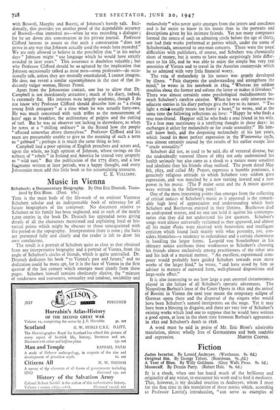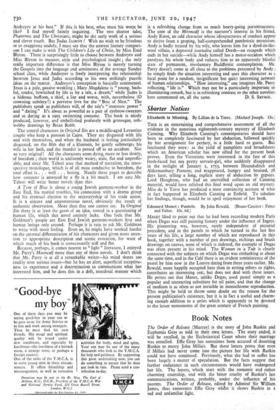Fiction
IT is a shock, when one has heard much of the brilliance and originality of any writer, to encounter his work and to find it mediocre. That, however, is my decided reaction to Andreyev, whom I meet for the first time in this translation of three stories which, according to Professor Lavrins introduction, " can serve as examples of
Andreyev at his best." If this is his best, what must his wort be like? I find myself faintly inquiring. The two shorter tales, Phantoms and The Christians, might be the early work of a serious and clever youth. But Judas Iscariot ! With no wish to be frivolous or to exaggerate unduly, I must say that the nearest literary compari- son I can make is with The Children's Life of Christ, by Miss Enid. Blyton. There is surprisingly little to choose,between Andreyev and Miss Blyton in manner, style and psychological insight ; the only really important difference is that Miss Blyton is merely turning the Gospels into the language and sentiments of the average Sunday school class, while Andreyev is freely interpreting the relationship between Jesus and Judas according to his own strikingly puerile ideas on the matter. Andreyev's conception is basically sentimental. Jesus is a pale, passive weakling ; Mary Magdalene is " young, bash- ful, tender, bewitched by life as by a tale, a dream," while Judas is a hideous buffoon, a thief, a liar and worse, with, nevertheless (0 crowning subtlety!) a perverse love for the " Best of Men." The publishers speak as publishers will, of the tale's " immense power " and " daring." It's about as powerful as a pair of eyebrow-tweezers and as daring as a 1905 swimming costume. The book is nicely produced, however, and embellished profusely with grotesque, cob- webby drawings by Brian Robb.
The central characters in Original Sin are a middle-aged Levantine couple who keep a pension in Cairo. They are disgusted with life and with themselves, and when the husband is feeling particularly disgusted, on the fifth day of a khamsin, he gently submerges his wife in her bath, and the murder is passed off as an accident. Not so very original! All the characters seem dying, more or less slowly, of boredom ; their world is uniformly weary, stale, flat and unprofit- able, and since Mr. Tabori uses that method of narration, the intro- spective monologue, which is of all most conducive to boredom, the total effect is . . . well . . . boring. Nearly three pages to describe how someone is annoyed by a fly is a bit much. I am sure Mr. Tabori will write better novels than this.
A Tent of Blue is 'about a young Jewish garment-worker in the East End, his marital troubles, his connection with a drama group and his eventual election to the secretaryship of his trade union. It is a sincere and unpretentious novel, obviously the result of authentic observation. More than that one cannot say. In Original Sin there is at least the germ of an idea, rooted in a questioning of human life, which this novel entirely lacks. One feels that Mr. Goldman's people are East End Jewish garment-workers first and human beings only second. Perhaps it is vain to ask Mr. Goldman to write with more feeling. Even so, he might have worked harder on the external differentiation of his characters and given more atten- tion to appropriate description and scenic evocation, for want of which much of his book is unnecessarily stiff and flat.
Because, perhaps, it comes nearest to " light " literature, 1 enjoyed Mr. Parry's Mooncalf more than any of these novels. I don't think that Mr. Parry is at all a remarkable writer—his mind skates too readily over serious issues—but he has an alert, superficial receptive- ness to experience and a determination to communicate what has interested him, and he does this in a deft, anecdotal manner which is a refreshing change from so much heavy-going portentousness. The core of the Mooncalf is the narrator's interest in his friend, Andy Knox, an odd character whose idiosyncrasies of conduct appear to derive from a groping, half-comprehended pantheistic mysticism. Andy is badly treated by his wife, who leaves him for a dyed-in-the- wool villain, a depraved journalist- called Derek—an escapade which ends in her suicide—while Andy himself has a motor-accident which paralyses his whole body and reduces him to an apparently blissful state of permanent, involuntary Buddhistic contemplation. Mr. Parry doesn't come at all close to the problems presented by Andy ; he simply finds the situation interesting and uses this character as a focal point for a random, insignificant but quite interesting network of human relationships. "How interesting," one imagines Mr. Parry reflecting, " life is." Which may not be a particularly important or illuminating remark, but is in refreshing contrast to the other novelists here commented on, all the same. D. S. SAVAGE.



































 Previous page
Previous page